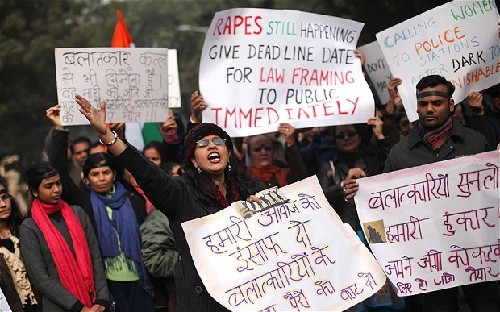|
查看原文
A man who allegedly drugged and raped his wife has been acquitted after a judge confirmed Indian rape laws do not apply to married couples.
Feminist campaigners said the judgment highlighted the failure of Indianlaw to protect the majority of women in the country – those who are married – from being raped or their right to refuse to have sex with their husbands.
In this latest case, the women, whose identity was not revealed, claimed her marriage was illegal and had been conducted against her will after she had been sedated.
A man, identified only as Vikash, had taken her to a registry office in Ghaziabad, just outside New Delhi, in March last year where he forced her to sign a marriage certificate while she was intoxicated. He later raped her and then fled, she alleged.
The accused denied drugging the woman or raping her and said their marriage had been consensual. She had only alleged rape six months after their marriage when they became involved in a property dispute.
In his judgment, Judge Virender Bhat said there was no evidence Vikash had drugged his wife or forced her to marry him but even if he had forced the complainant to have sex with him, it would not be a crime under Indian law.
"The prosecutrix (the wife) and the accused (Vikash) being legally wedded husband and wife, and the prosecutrix being major, the sexual intercourse between the two, even if forcible, is not rape and no culpability can be fastened upon the accused", the court ruled.
The ruling was made just over a year after the Indian government strengthened its rape laws and increased sentences amid a public outcry over the gang-rape and murder of a student on a Delhi bus.
The changes were based on the recommendations of the Verma Committee, headed by the late Justice Verma, who also urged the government to criminalise rape within marriage.
"Under the Indian Penal Code sexual intercourse without consent is prohibited. However, an exception to the offence of rape exists in relation to un-consented sexual intercourse by a husband upon a wife. The Committee recommended that the exception to marital rape should be removed. Marriage should not be considered as an irrevocable consent to sexual acts,” the Committee said in its report.
His recommendation however was rejected amid fears that it would encourage false cases and damage the institution of arranged marriages which are usually based on financial deals between families.
"Rape within marriage is not illegal in India which says everything about the position of women. We are donated for marriage rather than enter it as a partner. The ownership is with the man and whatever he does after marriage is acceptable", said Ranjana Kumari, a women’s rights campaigner who lobbied members of parliament on the issue.
Nilanjana Roy, a leading author and campaigner, said the law as it stands in India offers no protection to women raped by their husbands but can intervene in cases of domestic violence.
"Under Indian law, what the judge has said is correct and that is horrifying. It’s easier for a woman to file a case for a black eye. If a woman is being repeatedly raped in a marriage and he does not use extreme violence, she has no recourse in law, there is nothing she can do", she said.
|
查看译文
据外媒报道,在法官确认印度强奸法律不适用于已婚夫妇之后,一名涉嫌对其妻子服用麻醉剂后实施强奸的男子被判无罪。
女权活动家们说,该判决凸显印度法律的缺陷,这些法律在印度本应保护广大妇女(已婚妇女)不被强奸或其有权拒绝和丈夫做爱。
最新案件中,女受害者声称她的婚姻是非法的,是被灌醉之后做了违背意愿的事。
去年3月,名叫Vikash的男人把她带到新德里郊外的阿巴德一所登记处,在她不清醒的状态下强迫她在结婚证书上签字,后来又强奸了她,然后逃之夭夭。
被告否认给原告服用麻醉剂或实施强奸,并称他们的婚姻是自愿的。婚后六个月当他们发生财产纠纷时,她才指控丈夫强奸她。
在判决中,法官Virender Bhat表示:没有证据表明Vikash给他的妻子下药或强迫她嫁给他,但即使他强迫原告与其发生性关系,根据印度法律,也不是犯罪。
法院裁定:“女原告(妻子)和被告(Vikash)在法律上是合法夫妻,而且女原告(妻子)是成人,两者之间的性交,即使是强迫,也不认定为强奸,不能将罪行强加给原告。”
一年前,因新德里公交车上团伙强奸和谋杀一名学生引起公众强烈抗议,印度政府修订其强奸法并加重判刑。但法院依然做出了上述的裁决。
由大法官维尔马为首的委员会建议修订法律,并敦促政府对婚内强奸定罪。
委员会在其报告中表示:“根据印度刑法,未经同意禁止发生性行为。然而强奸罪的一个例外就是未经同意丈夫对妻子实施性行为。委员会建议婚内强奸的例外应该被废除。婚姻不应该被视作准许无条件地实施性行为。”
然而,由于担心这会助长虚假案件,并且还会损害常常基于两家庭之间金钱交易的包办婚姻制度,所以他的建议遭到拒绝。
就此问题游说国会议员的妇女权利活动家兰加纳•古默里说:“婚内强奸在印度并非违法,这一切反映了妇女的地位。与其说作为伴侣结婚,倒不如说把我们捐赠给了婚姻。男人占据主导权,而且婚后不管他做什么都是可以接受的。”
大作家及活动家兰加纳•古默里说,在印度就目前现状来说,法律对被丈夫强奸妇女没有提供保护,但可以干预家庭暴力案件。
兰加纳•古默里说:“根据印度法律,法官所说的是正确的,但也是可怕的。对女人来说挨打更容易立案。如果一个女人在婚姻中多次被强奸,而其丈夫没有用极端暴力的话,在法律上她没有追索权,所以她也就无能为力。”
(译者 Catheline 编辑 丹妮)
扫一扫,关注微博微信
 
|


